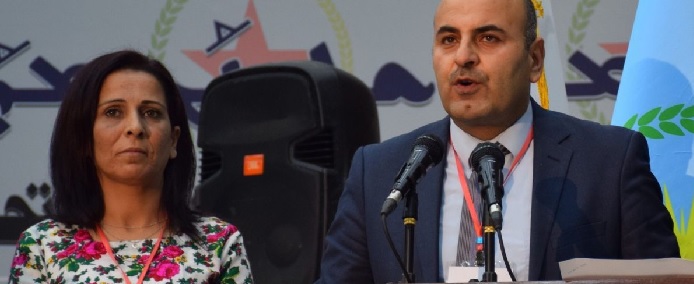
During the most recent military escalation by Syrian government forces and their allied militias in northwest Syria, which led to the displacement of more than one million people, media outlets—mostly opposition-leaning—reported that the Kurdish-dominated Syrian Democratic Forces (SDF) fought alongside the Syrian government forces. The SDF, however, has denied these claims.
Nevertheless, Aisha Hasso, the co-chair of the Democratic Union Party (PYD), which forms the backbone of the SDF, did not rule out the possibility of joining government and Russian forces in northwest Syria in the future. She, however, told Syria Direct reporter Mohammad Ibrahim, that such a scenario is conditional on an agreement with Damascus regarding the SDF’s position within the Syrian armed forces, admitting at the same time that “Damascus has not been freed from its mentality from before 2011.”
Hasso, who is originally from Balbala district in the northern countryside of Aleppo, was born in 1978. She was a member of the Star Union of Women, known now as Kongreya Star, before being elected as c0-chair of the PYD with Shahouz Hussein in September 2017, to succeed Salih Muslim and Asia al-Abdullah. She was re-elected as co-chair for a second tern with Anwar Muslim in February 2020.
The PYD was founded in 2003 under the guidance of Abdullah Ocalan, the founder of the Kurdish Workers’ Party in Turkey (PKK). After Ocalan and the Turkish government reached an agreement to dissolve the PKK and withdraw its fighters from Turkey, four of its affiliated parties were established in Turkey, Iraq, Iran, and Syria. In 2013, the PYD, with the participation of other Kurdish political parties, announced the formation of the Autonomous Administration of North and East Syria (AA).
How does the Autonomous Administration of North and East Syria view the recent military escalation in northwest Syria?
What is happening in Idlib is linked to the Astana process, which represents the agenda of Turkey, Russia, and Iran in Syria, while the role of the Syrian regime is just an implementation tool, as it had no direct presence in the Astana talks.
The critical situation in Idlib showcases the failure of the Astana process from the onset, and the conflicting interests of Russia, Turkey, and Iran interests in the region.
Concerning the position of the AA, we represent a third option. We are not on the side of the regime, nor on the side of the opposition that became hostage to the Turkish leadership. We have always been against the militarization of the Syrian crisis and in favor of a peaceful solution focused on Syrian-Syrian dialogue.
We see that the situation in Idlib is of a terrorist nature, because of the presence of terrorist entities, specifically Jabhat al-Nusra (the old name of Hayat Tahrir al-Sham), and we repeatedly questioned Turkey’s ability to control the situation there. We predicted its failure, and the result is now clear.
We expect changes regarding Idlib to affect the existing agreements, such as the Astana process. But the question regarding Turkey and Russia’s ability to control the current geographical map has yet to be addressed. We imagine that the situation in Idlib, both previously and currently, might become violent and affect the entire situation in Syria.
It’s well-known that Damascus follows a strategy of concentrating its military effort on each area outside of its control one at a time. Do you expect government forces to attack AA territory once the battle in Idlib is over?
The Syrian State has always had its unique approach that is based on exclusion, whether regarding military operations or governance. Concerning the possibility of the Syrian Army starting military campaigns in our areas, we are always in a position to defend ourselves and preserve our lands. At the same time, we emphasize the importance of dialogue — and specifically Syrian-Syrian dialogue — as I mentioned before. Everyone knows that there have been Russian efforts on more than one occasion to be the guarantor of talks between the Syrian government and the Autonomous Administration, but this role has not been effective.
Damascus’s mentality of exclusion has become clearer after the AA’s statements on practical steps concerning future meetings between the Regime and the AA.
In the case of any attacks [by government forces] in northeast Syria, SDF would be on the front line, as it did in response to the Turkish occupation. This is a natural and legitimate right, as we are the ones who ended terrorism in Syria, specifically ISIS. All international and regional powers know even as the Syrian state tries to downplay this fact.
Do you expect that the SDF will enter into an agreement with Damascus, supported by Russia, to fight the opposition and Turkey in Idlib? And if this happened, what do you expect in return?
Any agreement with Russia and Damascus concerning the SDF’s participation in fighting against Turkey and the opposition armed groups in Idlib must be accompanied with an agreement regarding the position of the SDF in the Syrian armed forces, especially since the SDF is now considered the most effective military force on the ground, as it is the one that actually fought the oppression of ISIS.
If the regime accepted to discuss this subject, then the decision to participate in the battles of Idlib would rest on the SDF.
What are the possible effects of the battles in northwest Syria on the negotiations between the Kurds [SDF] and Damascus?
As I said in the previous answer, Damascus has not been freed from its pre-2011 mentality and it always wants to return to the pre-2011 approach.
The regime must accept changes [that took place since 2011], as well as the current situation in Syria. Since 2011, Syria has witnessed changes in all respects including politics and military affairs. Damascus must recognize the struggle of the AA, which has become the real project in Syria. We are always open to a Syrian-Syrian dialogue.
